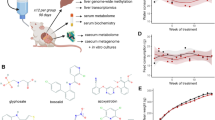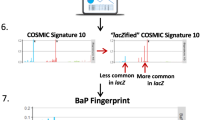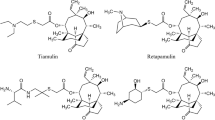Abstract
THE Salmonella typhimurium/mammsilmn microsome test of Ames et al.1 has provided a simple and sensitive short term assay for the detection of environmental mutagens. Moreover, there is excellent correlation between a positive reaction of the compounds so far tested in this prokaryotic test system and their carcinogenicity2–4. Metabolic activation of precarcinogens is achieved by incubating, on Petri dishes, the compounds to be tested, the bacterial strains and liver homogenates together with a NADPH generating system1. The opposite phenomenon, that is conversion from mutagenically active to inert compounds, is also widely known to occur in vivo5,6 and inactivating enzymes have also been identified for some reactive metabolites7. However, the possibility of checking deactivation of the mutagenic potential of chemicals by means of the same in vitro system set up for metabolic activation has received little attention. The results reported here provide evidence that some compounds which are mutagenic per se for S. typhimurium can be partially or totally deactivated in the presence of liver homogenates. This possibility should be considered when results of the Salmonella/microsome assay are interpreted, and correlated with animal and epidemiological data.
This is a preview of subscription content, access via your institution
Access options
Subscribe to this journal
Receive 51 print issues and online access
$199.00 per year
only $3.90 per issue
Buy this article
- Purchase on Springer Link
- Instant access to full article PDF
Prices may be subject to local taxes which are calculated during checkout
Similar content being viewed by others
References
Ames, B. N., Durston, W. E., Yamasaki, E. & Lee, F. D. Proc. natn. Acad. Sci. U.S.A. 70, 2281–2285 (1973).
McCann, J., Choi, E., Yamasaki, E. & Ames, B. N. Proc. natn. Acad. Sci. U.S.A. 72, 5135–5139 (1975).
McCann, J. & Ames, B. N. Proc. natn. Acad. Sci. U.S.A. 73, 950–954 (1976).
Purchase, I. F. H. et al. Nature 264, 624–627 (1976).
Epstein, S. S. Rev. environm. Path. 66, 352–373 (1972).
Miller, J. A. & Miller, E. C. in Screening Tests in Chemical Carcinogenesis(eds Montesano, R., Bartsch, H. & Tomatis, L.) 153–176 (IARC, Lyon, 1976).
Oesch, F. & Glatt, H. R. in Screening Tests in Chemical Carcinogenesis(eds Montesano, R., Bartsch, H. & Tomatis, L.) 225–274 (IARC, Lyon, 1976).
Ames, B. N., McCann, J. & Yamasaki, E. Mutat. Res. 31, 347–364 (1975).
Brinton, H. P., Frasier, E. S. & Koven, A. L. Public Hlth Rep. 67, 835–847 (1952).
Bidstrup, P. L. & Case, R. A. M. Br. J. ind. Med. 13, 260–264 (1956).
Enterline, P. E. J. occup. Med. 16, 523–526 (1974).
Petrilli, F. L. & De Flora, S. (in preparation).
Petrilli, F. L. & De Flora, S. Appl. environ. Microbiol. 33, 805–809 (1977).
Venitt, S. & Levy, L. S. Nature 250, 493–495 (1974).
Author information
Authors and Affiliations
Rights and permissions
About this article
Cite this article
DE FLORA, S. Metabolic deactivation of mutagens in the Salmonella-microsome test. Nature 271, 455–456 (1978). https://doi.org/10.1038/271455a0
Received:
Accepted:
Issue Date:
DOI: https://doi.org/10.1038/271455a0
This article is cited by
-
Metabolic reduction of chromium, as related to its carcinogenic properties
Biological Trace Element Research (1989)
-
In vitro assessment of the toxicity of metal compounds
Biological Trace Element Research (1982)
Comments
By submitting a comment you agree to abide by our Terms and Community Guidelines. If you find something abusive or that does not comply with our terms or guidelines please flag it as inappropriate.



